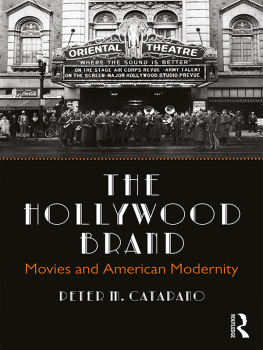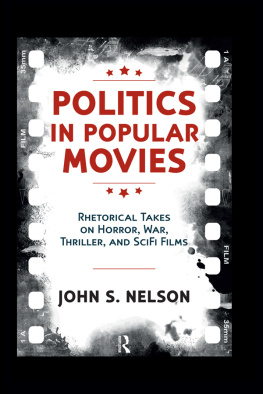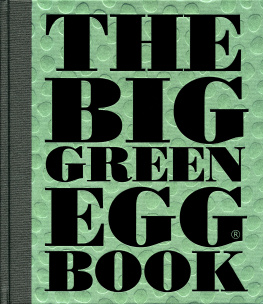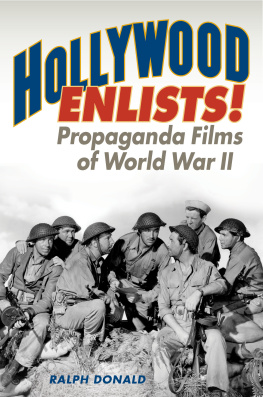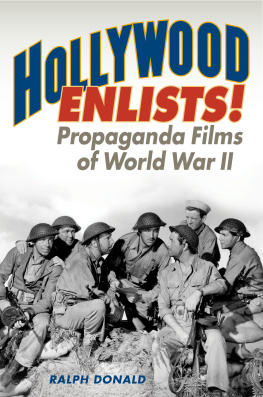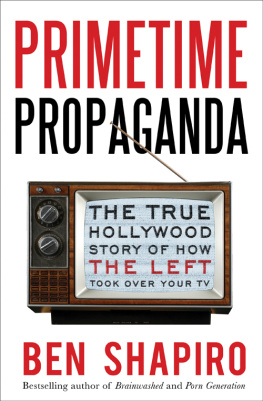Koppes - Hollywood Goes to War : How politics, profits, and propaganda shaped World War II movies
Here you can read online Koppes - Hollywood Goes to War : How politics, profits, and propaganda shaped World War II movies full text of the book (entire story) in english for free. Download pdf and epub, get meaning, cover and reviews about this ebook. year: 1987, genre: Politics. Description of the work, (preface) as well as reviews are available. Best literature library LitArk.com created for fans of good reading and offers a wide selection of genres:
Romance novel
Science fiction
Adventure
Detective
Science
History
Home and family
Prose
Art
Politics
Computer
Non-fiction
Religion
Business
Children
Humor
Choose a favorite category and find really read worthwhile books. Enjoy immersion in the world of imagination, feel the emotions of the characters or learn something new for yourself, make an fascinating discovery.

Hollywood Goes to War : How politics, profits, and propaganda shaped World War II movies: summary, description and annotation
We offer to read an annotation, description, summary or preface (depends on what the author of the book "Hollywood Goes to War : How politics, profits, and propaganda shaped World War II movies" wrote himself). If you haven't found the necessary information about the book — write in the comments, we will try to find it.
Koppes: author's other books
Who wrote Hollywood Goes to War : How politics, profits, and propaganda shaped World War II movies? Find out the surname, the name of the author of the book and a list of all author's works by series.
Hollywood Goes to War : How politics, profits, and propaganda shaped World War II movies — read online for free the complete book (whole text) full work
Below is the text of the book, divided by pages. System saving the place of the last page read, allows you to conveniently read the book "Hollywood Goes to War : How politics, profits, and propaganda shaped World War II movies" online for free, without having to search again every time where you left off. Put a bookmark, and you can go to the page where you finished reading at any time.
Font size:
Interval:
Bookmark:
To our parents,
Dale and Marcella Black and
Clinton and Effie Koppes and to
Carol, Jason, and Bill
Are we ready to depart from the pleasant and profitable course of entertainment, to engage in propaganda1?
Production Code Administration, internal memo, December 1938
The spectacle that began on September 9, 1941, required the best talents of Hollywood and the United States Senatetwo American institutions that, whatever their serious purposes, were no strangers to illusion or melodrama. The setting was the Caucus Room of the Senate Office Building, whose ostentatious grandeur even a movieland set designer would have found hard to surpass. The occasion was serious. A specially empaneled subcommittee of the Committee on Interstate Commerce began an investigation of war propaganda disseminated by the motion picture industry and of any monopoly in the production, distribution, or exhibition of motion pictures.1
If not quite a cast of thousands, the proceedings nonetheless attracted a diverse crowd of principals and hangers-on: senators, lawyers, America-Firsters, journalists, publicists, movie moguls and their retinues. Much of the attention focused on Senator Gerald P. Nye, the isolationist firebrand from North Dakota, whose charges against Hollywood had triggered the hearing. Jostling with Nye for the spotlight was the industrys counsel, Wendell Willkie, the 1940 Republican presidential nominee who had become a staunch supporter of President Roosevelts international policies. Playing unfamiliar supporting roles were the studio heads.
They faced serious charges. Isolationists, frustrated with their losing battle to get their case into national media, contended that Hollywood had embarked on a devious campaign to inject its entertainment pictures with propaganda and drag America into the war. That charge was closely related to anotherthat through monopoly control the industry dictated what could and could not be shown in the movies. The ostensible purpose of the hearings was to determine whether Congress should enact legislation to deal with the age-old problem of motion-picture content; Willkie and the industry, however, charged that the hearings real purpose was to gain publicity for the isolationist cause. Since Hollywood and the Senate both thrived on publicity, in combination they were sensational.2
The 1941 hearings were but one of a series of encounters between Hollywood and Congress during the turbulent 1940s. Although the Hays Office tried to steer the studios away from political subjects, the movie producers, whether for reasons of conscience, profit, or sheer human interest, could not avoid politics and war. The industry fared much better in the 1941 hearings than in postwar inquests into communism in Hollywood, thanks both to the ineptitude of the isolationists and to the forthright defense orchestrated by Willkie. The occasion turned into something of a political coming-out party for an industry that had officially kept its politics closeted.
The international situation was tense indeed in the fall of 1941, and Americans carried on an increasingly acrimonious debate about how to respond to it. Hitlers army straddled Europe, from the English Channel to the Ukraine, from Norway to North Africa. The Red Army, reeling in the face of the lightning thrusts of the panzer divisions of the Soviet Unions erstwhile ally, would eventually make a heroic winter stand at Stalingrad that would turn the tide of the war. But in September 1941 a Russian defeat seemed possible, which would leave Hitler master of all Europe. The Japanese, having occupied a sizable portion of China and all of Indochina, were moving on the Dutch East Indies in search of the oil that was essential to their war machine. A demoralized France had fallen in six weeks in the spring of 1940. Great Britain, indomitable in the face of the Luftwaffes blitz, held the torch for the democracies. But it was short of everythingmen, money, materieland clung to the hope that in Gods good time the New World would come to the rescue of the old.
The United States, convoying British ships laden with Lend-Lease goods across the Atlantic, was increasingly drawn into an undeclared naval war with Germany. As the skirmishes escalated, President Roosevelt issued a sink-on-sight order against the German U-boatsthe rattlesnakes of the Atlantic, in his potent phraseand the non-existent war would claim the lives of 110 American seamen by Thanksgiving. As inconclusive peace negotiations with Japanese envoys ground on in a Washington hotel room, no one could anticipate that the great debate would end on the first Sunday morning in December when sudden death rained from a clear sky at Pearl Harbor.
Instead, the isolationists girded for a last-ditch struggle against Americas inexorable drift towards intervention. They knew that three-fourths of the public supported Roosevelts policy of all aid short of war to the nations fighting the Axis. The non-interventionists rejoined, however, that all aid short of war led ineluctably to war. Fearing a bloodbath, and believing that the United States could do business with Hitler, they mounted an increasingly shrill campaign against the president and his policies. One of their leaders, Senator Burton K. Wheeler, Democrat of Montana, attacked Roosevelts internationalism as a foreign policy AAAit will plough under every fourth American boy. The president responded that this was the rottenest thing hed ever heard in American public life. I hate war, Roosevelt declared in his 1940 campaign for a third term. Your boys are not going to be sent into any foreign war. But after FDRs re-election, Congressfollowing an impassioned radio appeal by the presidentpassed Lend-Lease. And, in an extraordinary departure for the head of a nonbelligerent nation, Roosevelt met secretly with Churchill off the coast of Newfoundland in August 1941. From this first summit they jointly issued the Atlantic Charter, a declaration of Anglo-American war aims even though the United States was not at war?
Roosevelt well knew that the modern president, embodiment of what is sometimes styled an imperial presidency, commands policy, and commands news. Members of Congress were no match for him on radio which, unlike print, tends to focus on one individual at a time. The isolationists knew they were being outflanked by the media-wise Roosevelt and resented it deeply. Unable to rein him in, they turned their anger on the media.
In late December 1940, on the eve of the Senates debate on Lend-Lease, Roosevelt delivered one of his most famous fireside chats, his arsenal of democracy speech. Senator Wheeler countered with a fiery rebuttal. The national radio networks, bound by the equal time doctrine that governed the public air waves, carried Wheelers rejoinder. But in the private mediathe newspapers and the film companies newsreelscoverage of the isolationists was sparse to nonexistent. Wheeler was furious. Will you kindly inform me when, if at all, you intend to carry my answer? he demanded of Paramount News. And what, if anything, you are going to do about carrying both sides of the controversy on pending legislation which directly involves the question of war or peace? He added ominously that the motion picture industrys propaganda for war had reached the point where legislation might be needed to ensure a more impartial attitude on Hollywoods part. Since Wheeler was the powerful chairman of the Committee on Interstate Commerce, his was no idle threat. Even worse he and Nye objected to a series of feature films produced in Hollywood between 1938 and 1941 that in their opinion supported FDRs interventionist policies.4
Will Hays responded by denying that the industry was taking a stand on controversial issues. Newsreels in 1940 contained factual reports on national defense subjects in only 16 percent of the cases, he said. Political subjects figured in only 2.4 percent of the one and two-reel short subjects, and European political subjects in less than .5 percent. Only 27 of the 530 feature films, or 5 percent, pertained in any way to political events. Read from another perspective, Hays statistics suggested that Hollywood was not paying much attention at all to the rest of the world. Hays did not mind. When war broke out in Europe in 1939 he had issued a widely quoted statement: There will be no cycle of hate pictures. The primary purpose of the essential service of motion pictures is entertainment entertainment which will be effective as such, and entertainment which is, at its best, inspirational. This was pure Hoosier boilerplate. The doctrine had outlived its usefulness as Hollywood confronted a world at war.5
Next pageFont size:
Interval:
Bookmark:
Similar books «Hollywood Goes to War : How politics, profits, and propaganda shaped World War II movies»
Look at similar books to Hollywood Goes to War : How politics, profits, and propaganda shaped World War II movies. We have selected literature similar in name and meaning in the hope of providing readers with more options to find new, interesting, not yet read works.
Discussion, reviews of the book Hollywood Goes to War : How politics, profits, and propaganda shaped World War II movies and just readers' own opinions. Leave your comments, write what you think about the work, its meaning or the main characters. Specify what exactly you liked and what you didn't like, and why you think so.

